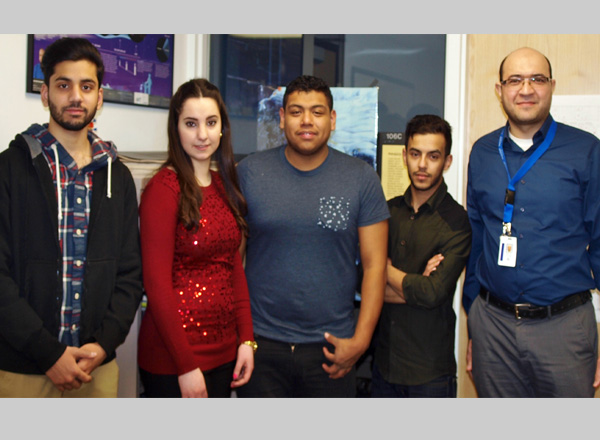Student Engineering Team Finalist in National Competition

A team of four Pre-Engineering students recently earned selection as a finalist in the Community College Innovation Challenge (CCIC) Boot Camp at the National Science Foundation (NSF) in Arlington, Va. June 15-18. The American Association of Community Colleges (AACC) will host this all-expenses paid event in partnership with the NSF. Team members are (left to right in photo) Ibraheem Nadeem (Pre-Engineering and Honor student), Maria Hanna (Pre-Engineering and Honor student), Isauro Sanchez (Pre-Engineering student), Omar Dahbali (Pre-Engineering student and President of Engineering Club), and Hassan Nameghi (Pre-Engineering Coordinator).
Innovation Boot Camp provides a hands-on learning opportunity for 10 finalist teams to further develop their ideas/innovations through workshops and technical assistance focused on building innovation, entrepreneurship and strategic communication skills as they propose solutions to perplexing real-world problems.
More than 40 percent of undergraduate students are enrolled at community colleges throughout the United States. Groups underrepresented in the fields of science, technology, engineering and mathematics (STEM), as well as first-generation college students, make up a significant portion of students on community college campuses. NSF-funded projects at community colleges support STEM students transferring to four-year colleges. In addition, NSF-supported projects help students receive education and training to become part of the high-tech workforce. This includes fields as diverse as biotechnology, cybersecurity and advanced manufacturing.
Based on the creative potential of these students, the NSF invited teams of community college students to identify key problems and propose innovative solutions in areas with potential for solving some of America's most daunting challenges: big data, infrastructure security, sustainability (including water, food, energy, and environment) and broadening participation in STEM fields. HFC’s team is comprised of students Ibraheem Nadeem, Omar Dahbali, Isauro Sanchez and Maria Hanna. Their project is called “Real-Time Accident Detection on Michigan Highways,” and they are currently developing a computerized accident detection system for Michigan highways. The traffic data captured by thousands of video cameras across Michigan can be processed into image pixels using Image Processing Software (IPS).
Computer models, including traffic simulation models, simulate different scenarios of road congestion and decrease in road access due to an accident. If this is successfully implemented, it will have countless benefits in areas such as economics, society, industry and science. It will reduce traffic delay, disruption, and casualties after a vehicular accident. In addition, it will contribute to faster movements of goods and people, which directly lead to a better economy. It will benefit society by providing a safer and less stressful environment. A reduction in accident response time will also result in less traffic jams, less air pollution and less gas consumption.
The NSF will distribute $500 to each team to assist with the development of their displays, models and/or prototypes for this event. The 10 teams will have the opportunity to display their projects as part of a reception that takes place on Capitol Hill in the Rayburn House Office building on Wednesday, June 17. Invitees will include congressional members who will meet with teams to learn about their ideas and proposed solutions.
“This honor is yet another example of the great things happening at HFC, the dedication of our faculty, the talent of our students and their focus on excellence as demonstrated by being one of the nation’s best,” said Dr. Tracy P. Pierner, HFC vice president of Academic Affairs.
Innovation Boot Camp furthers the NSF’s mission by enabling students to discover and demonstrate their ingenuity to use science to make a difference in the world and transfer knowledge into action. It also furthers the benefit of incorporating research into the traditional teaching mission of the community college.
To see video of the HFC student team project, please visit http://youtu.be/DXSLL4KuTYY.